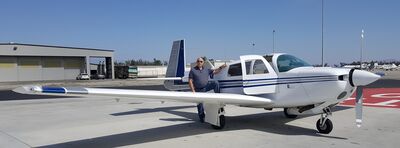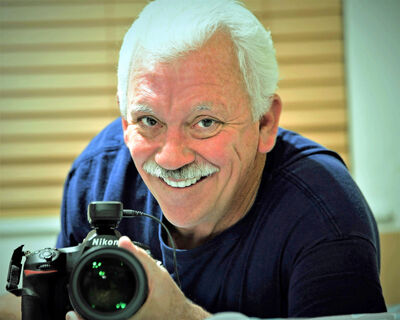Boeing - Sad
Jan 28, 2024 12:36:55 #
jerryc41 wrote:
Teeth are for eating, and having so many inspectors ate up a lot of profit. Boeing got rid of many inspectors, but it recently started hiring some.
Where are you getting your information? Or is this you opinion.
Jan 28, 2024 12:42:08 #
jerryc41 wrote:
Right, but Boeing's problem is that it does not include "quality" in its products. Assuming that everyone does a perfect job is a bad way to run a company. An inspector can catch a mistake so someone can correct it. That's a better plan than having the NTSB find mistakes. Many crashes have been caused by repairs that were not inspected after the work was done - using the wrong part or installing the right part incorrectly. "Two heads are better than one."
None of the changes you cite are done without the approval of the FAA. Boing can't make changes willy-nilly just to increase their profit margin.
Jan 28, 2024 13:05:27 #
Perhaps this may be of interest:
"A fully assembled Airbus A320 aircraft consists of 340,000 parts. Airbus also states that when all individual sections are completed, it takes nearly 30 days for the final assembly of the aircraft. Moreover, the production lead time of an A320 from piece-part manufacturing to aircraft delivery takes approximately one year. A Boeing 737 MAX aircraft consists of roughly 500,000 parts."
It is not practical for a manufacturer to produce ALL of the engineering and to manufacture EVERY part themselves and all that goes with it. Large manufacturers have created subsidiaries and spin-off corporations that work solely for the parent corporation.
Even NASA relies on subcontractors to design and manufacture parts that it needs for its space programs.
"A fully assembled Airbus A320 aircraft consists of 340,000 parts. Airbus also states that when all individual sections are completed, it takes nearly 30 days for the final assembly of the aircraft. Moreover, the production lead time of an A320 from piece-part manufacturing to aircraft delivery takes approximately one year. A Boeing 737 MAX aircraft consists of roughly 500,000 parts."
It is not practical for a manufacturer to produce ALL of the engineering and to manufacture EVERY part themselves and all that goes with it. Large manufacturers have created subsidiaries and spin-off corporations that work solely for the parent corporation.
Even NASA relies on subcontractors to design and manufacture parts that it needs for its space programs.
Jan 28, 2024 14:14:53 #
rcarol wrote:
"Profit" is not a dirty word. Not many businesses survive without it.
Balance and fairness and Integrity are not dirty words either.
Jan 28, 2024 15:35:26 #
pendennis wrote:
Well quoted! I had the honor of attending one of ... (show quote)
Frank and Lillian Gilbreth were pioneers in motion study and efficiency. "Cheaper by the Dozen" (the book and 1952 movie) is about them. She invented the pedal-operated trash can.
https://web.mit.edu/allanmc/www/TheGilbreths.pdf
Jan 29, 2024 12:09:25 #
jerryc41 wrote:
You almost have to feel sorry for Boeing. Did you... (show quote)
When I worked for Boeing in Everet in 2013 I was very disappointed in the quality of the delivered products from Spirit.
Jan 29, 2024 12:12:36 #
lbrande wrote:
When I worked for Boeing in Everet in 2013 I was very disappointed in the quality of the delivered products from Spirit.
As I said above - "Sad."
Jan 29, 2024 12:15:13 #
jerryc41 wrote:
As I said above - "Sad."
It wasn't an issue with the majority of engineers nor with the managers.
Jan 29, 2024 12:19:41 #
lbrande wrote:
It wasn't an issue with the majority of engineers nor with the managers.
Not surprising. A big problem is subcontractors, something that Spirit makes use of.
Jan 29, 2024 12:28:32 #
Boeing has for 60 plus years been a designer and integrator of some fantastic commercial aircraft. They sold off their parts and sub assembly business in KS, to what became Spirit. They sold their giant machine parts and composite facility in St Louis to GKN. They sold off or divested most of their other parts business over many years. In the US Boring is the largest buyer of details and sub assemblies in aviation. Their reliance on subcontractors for everything from washers to complete systems like landing gear and huge structural assemblies. So managing the quality and delivery of these subcontracted parts is nothing new or radical to their business model. The 747 Boeings crowning achievement was largely produced by other companies. Boeing built the 41 section, (cockpit nose section) and the wings. Northrop did most of the detail design and built all the fuselage and floor, shipping them in oversize rail cars to Boeing. The tail a horizontal stabilizers by Vaught. The landing gear etc and many other large assemblies by suppliers.
Boeings current problems are of their own doing. Don’t feel sorry for them. Airbus has been creeping up on Boeing and has surpassed them in a big way. That’s put a lot of pressure on them, but quality and delivery can never be compromised for anything.
Boeings current problems are of their own doing. Don’t feel sorry for them. Airbus has been creeping up on Boeing and has surpassed them in a big way. That’s put a lot of pressure on them, but quality and delivery can never be compromised for anything.
Jan 29, 2024 12:30:32 #
Chris Hayes wrote:
Boeing has for 60 plus years been a designer and i... (show quote)
When they sold all of that, their income must have been huge! Bonuses all around!
Jan 29, 2024 14:06:28 #
There are basically three parts to an aircraft: fuselage, avionics, mechanical equipment
The fuselage is the obvious part we all recognize, but also the least technically challenging (ok…composites…but put that aside).
Most mechanical stuff (fuel system, engines, control actuators, pumps, generators) is bought, as is the avionics as an integrated package. Cost breakdown is approximately 20/40/40.
My company has been outsourcing fuselage work for decades, sometimes overseas. It just makes no sense to use high priced labor to do low skilled work. I remember watching a Taiwan nose get joined flawlessly to a Japanese cabin for the first time almost 30 years ago.
Yes…it is up to the engineers to design a supply chain that minimizes risks from noncompliance, and implement a quality control system that transcends borders and distances.
The fuselage is the obvious part we all recognize, but also the least technically challenging (ok…composites…but put that aside).
Most mechanical stuff (fuel system, engines, control actuators, pumps, generators) is bought, as is the avionics as an integrated package. Cost breakdown is approximately 20/40/40.
My company has been outsourcing fuselage work for decades, sometimes overseas. It just makes no sense to use high priced labor to do low skilled work. I remember watching a Taiwan nose get joined flawlessly to a Japanese cabin for the first time almost 30 years ago.
Yes…it is up to the engineers to design a supply chain that minimizes risks from noncompliance, and implement a quality control system that transcends borders and distances.
Jan 29, 2024 15:37:43 #
Jan 29, 2024 18:00:03 #
Just like hospitals who pay their administrators so much they can't afford to treat their employees right. My conclusion is that if they can't treat their employees right, how are they going to treat their patients with the care that they advertise. I worked for one thirty years so I think I know a little about them. I know of at least two doctors the parent company got rid of because they didn't make enough money for the corporation.
Jan 29, 2024 18:35:18 #
jerryc41 wrote:
Ah, yes. Profit.
Not so profitable if their aircraft are falling out of the sky.
If you want to reply, then register here. Registration is free and your account is created instantly, so you can post right away.




